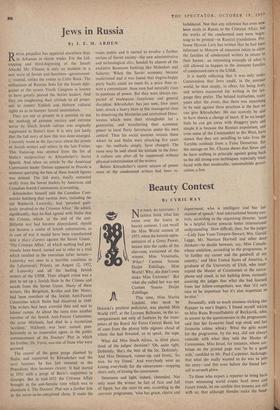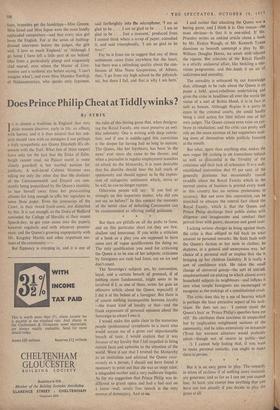Beauty Contest
By CYRIL RAY Zubillaga.
This time, Miss Marita Lindahl, who must be Helsinki's prettiest pedicurist, was elected Miss World 1957, at the Lyceum Ballroom, to the ac- companiment not only of fanfares by the trum- peters of the Royal Air Force Central Band, but of coos from the plump little pigeons ahead of whom she had breasted, so to speak, the tape.
What did Miss South Africa, in third place, think of the judges' decision? 'Oh, quite right. Definitely. She's the best of the lot. Definitely. And Miss Denmark, runner-up, said firmly, 'Iss nice. Iss my friend.' And everybody went on kissing everybody for the cameramen—stopping short, only, of kissing the cameramen.
Sweetness and light, indeed, abounded. Not only must the winner be fair of face and full of figure, but she must be one, according to the souvenir programme, 'who has grace, charm and deportment, who is intelligent and has fair manner of speech.' And international beauty con- tests, according to the organising director, 'must be a helpful factor towards better international understanding.' How difficult, then, for the judges —Lady Jane Vane-Tempest-Stewart, Mrs. Gerald ' Legge, Mr. Norman Hartnett and other deep thinkers—to decide between, say, Miss Canada, whose ambition, according to the programme, is `to further my career and the goodwill of my country,' and Miss United States of America, a graduate of the University of Utah, who inter- rupted the Master of Ceremonies at the micro- phone and stood, in her bathing dress, earnestlY assuring the judges that what she had learned from her fellow-competitors was that 'it's very nice to be important but it's also important to be nice.'
Personally, with so much niceness sticking like flypaper to one's fingers, I found myself taking to Miss Runa Brynjolfsdottir of Reykjavik, who, in answer tn the questionnaire in the programme, said that her favourite food was steak and her favourite colour whisky. What the girls wrote for the programme, by the way, did not always coincide with what they told- the Master of Ceremonies. Miss Israel, for instance, whose am- bition on the printed page was `to be a good wife,' confided to Mr. Paul Carpenter, backstage, that what she really wanted to do was to join the army—and this even before she found her- self in seventh place.
To those who expect a reporter to bring back from witnessing world events hard news and future trends, let me confide that bosoms are still with us; that although blondes make the head- lines, brunettes get the handclaps—Miss Greece, Miss Israel and Miss Japan were the most loudly applauded competitors—and that every nice girl loves the English. For at the series of bathing- dressed interviews before the judges, the glib said, 'I love so much England,' or 'Although I go home I have left a little part of me behind' (this from a particularly plump and exiguously clad morsel, over whom the Master of Cere- monies cast a sardonic eye before saying, 'I can't imagine what'), and even Miss Muneko Yorifuji, of Nishinomomiya, who speaks only Japanese, said forthrightly into the microphone, 'I am so glad to be . . . I am so glad to be . . . I am so glad to be . . . Just a moment,' produced from I cannot think where a scrap of paper, consulted it, and said triumphantly, 'I am so glad to be here!'
Far be it from me to suggest that any of these sentiments came from anywhere but the heart, but there was a refreshing quality about the con- fession of Miss Nana Gasparatou, of Athens, that, 'I go from my high school-to the polytech- nic, but there I fail, and that is why I am here.'



































 Previous page
Previous page